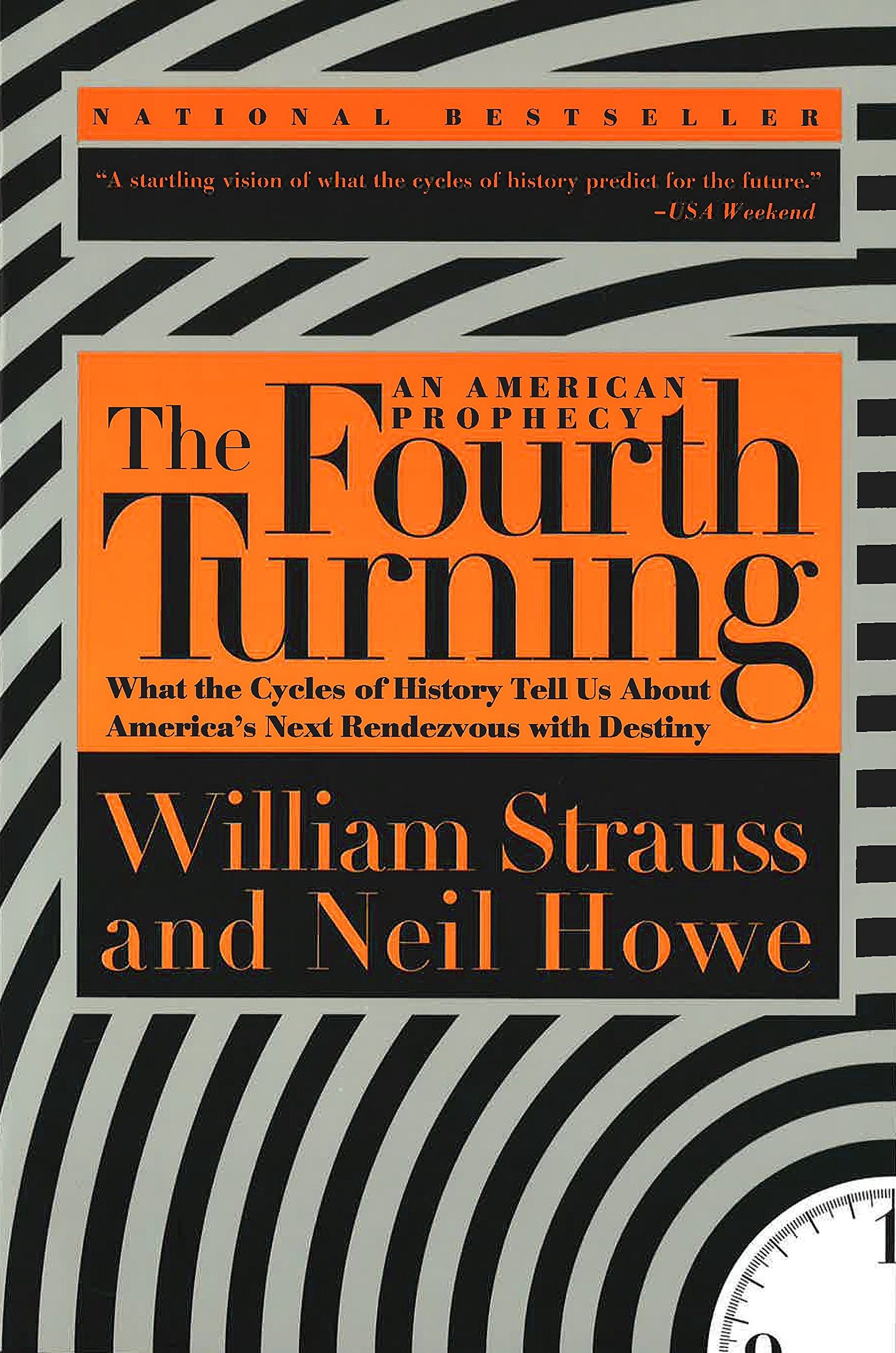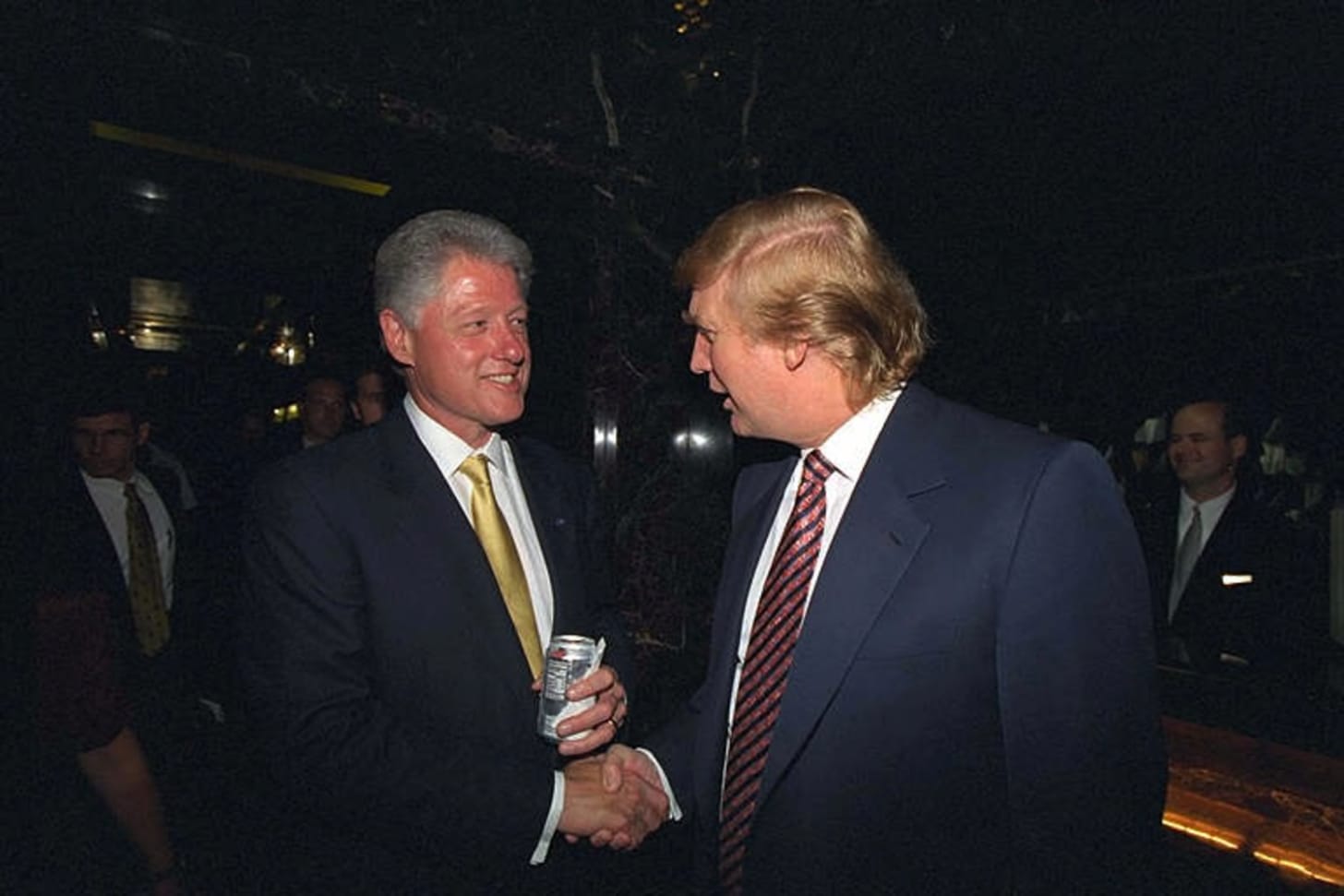In 1997, William Strauss and Neil Howe published a book called The Fourth Turning: An American Prophecy in which they argue that history unfolds in a somewhat predictable manner. Their thesis was that the environment in which a generation is raised affects their outlook, causing them to act in a certain manner when they come of age. Strauss and Howe observed that every four generations, society goes through something of a reset, where the old order is overturned and a new one begun. The previous so-called fourth turnings in American history resulted in the War for Independence and the Constitution, the Civil War, and the Great Depression and World War II. Strauss and Howe predicted that the United States would experience another fourth turning starting around 2005.
In 1997, this seemed like a crazy prediction. After all, the 1990s were perhaps the height of American prosperity, a halcyon time between the end of the Cold War and the terror of 9/11. Yet the events of the last fifteen years have proven them right. Turmoil started in 2008, with the start of the Great Recession, and accelerated in 2016 with the election of President Donald Trump and the extreme reaction to his victory. This turmoil has accelerated further with the Covid-19 pandemic and lockdowns as well as the crackdown on free speech and political dissidents after January 6th 2021. Today, we are in the midst of a social upheaval no less dramatic than any other time in our history.
How did Strauss and Howe do it? There was nothing magical about their prediction. They simply looked at the way generations interact with their times. The generation of men and women who grew up in the 1990s have a dramatically different outlook than those who grew up during the Great Depression and fought in World War II. A generation that grew up in hardship work to create prosperity, while one that grows up in prosperity often ends up seeking something more. Each generation will make different choices based upon how they see the world, and those choices will change the course of history. This has the side effect of creating a generation gap, where older folks and young people have trouble understanding each other’s positions and motivations.
Consider how each generation was formed:
The Greatest Generation was raised in the privations of the Depression and fought World War II. Even those not on the front lines were profoundly affected by this fight and the way America united to defeat Nazi Germany and Imperial Japan.
The Silent Generation was born during the Depression and were too young to fight in the war. Of all the postwar generations, these were, well, the quietest. They never really coalesced as a distinct group set apart from the others.
The Baby Boomers were raised in the postwar prosperity where good jobs were plentiful and technology gave us new miracles seemingly every day. They were the first generation to grow up with television and popular music, and the first generation to be explicitly advertised to. The assassination of President John F. Kennedy was a shocking moment that everyone in this generation remembers.
Generation X was raised in the cynical times following the era of Civil Rights and the optimism of the 1960s. They were the first latchkey kids, and they generally resented the outsized influence of their Boomer elders. They see themselves as the missing generation, more grounded than either the Boomers or the Millennials.
Millennials grew up in the 1990s, and barely remember the Cold War. The internet and mobile phones came about when they were teenagers or even adults, so they took to them quickly but can still recall a time before they were ubiquitous. They gained a reputation for laziness that was only partly deserved. 9/11 is the Millennial version of the JFK assassination.
Generation Z are digital natives who find it hard to take the world seriously. They consider the older generations to be overly pretentious. Irony is their favorite - and sometimes only - perspective. Progressive Zoomers are extremely left-wing, and LGBTQ+ identification is widespread, but conservative Zoomers are much more right-wing than their elders, seeking a return to lost traditions.
Obviously there are exceptions to each of these generalizations. Not every member of each generation thinks the same way. But keeping these distinctions in mind explains the lens through which each generation as a whole sees our society. It is easy to see how a Baby Boomer who grew up in the 1950s will see the world differently than a Millennial who came of age around 9/11. In the 1950s, Americans thought that their media and government were trustworthy. They assumed that America was a force for good in the world, and that her best days would always lie ahead. A Millennial, on the other hand, sees the media as profit-driven liars and politicians as fundamentally dishonest. For leftist Millennials, America is irredeemably racist, while conservatives lament how our culture has been reduced to nothing but degeneracy. Millennials have watched our country decline, and fear that the prosperity the Boomers take for granted will be gone by the time they retire.
In 1992, the election of President Bill Clinton was presented as a passing of the torch as the Baby Boomers took the reigns of politics from their fathers that had fought World War II. Today, Donald Trump is seen as the last gasp of the Boomers. Joe Biden is even older, technically one of the Silent Generation. Many young people, while supporting President Trump personally, find themselves far removed from his generation. It is as if we speak completely different languages.
Boomers and GenX-ers were shocked by scandals like Watergate and the Monica Lewinsky affair. They were horrified at the way the government handled Ruby Ridge and Waco. They could not believe it when Edward Snowden exposed the way our government was spying on the American people. On the other hand, Millennials mostly shrugged. They have understood since birth that our government was evil, so none of these things were surprising. Consider that older Americans are more likely to view Mr. Snowden as a traitor for disclosing military secrets while the younger generations see him as a hero for exposing an unconstitutional and immoral program. Older generations find it hard to think of Russia as anything less than our eternal enemy, while younger conservatives wonder what is wrong with considering them as a potential friend and ally.
The Boomer looks at the problems in our country and says “It’s worth fighting for,” while Millennials and Zoomers are more apt to say “Let’s scrap it and start over.” Boomers look at Millennials as lazy, entitled, and unserious, while Millennials see Boomers as out-of-touch and stuck in the past. Yet we need all generations to work together if we are to have any hope of saving our civilization.
A few weeks ago, The Claremont Institute’s Glenn Ellmers collaborated with a graduate student at Hillsdale College named Josiah Lippincott on a piece describing the generation gap in conservative politics. The entire essay is very much worth reading, and is exactly the sort of dialogue that is necessary for each generation to understand the others:
Contrary to some prejudices among the younger Right, not every self-identified conservative over 50 is deluded and useless. Likewise, older conservatives need to know that not every young, right-wing provocateur on Twitter is a racist anarchist. But a lot of people on either side see each other that way, largely because the regime’s vast propaganda machine is able to re-enforce both of these prejudices.
Ellmers and Lippincott describe what the older generations need to understand about young people. Boomers might well ask of Millennials, “Do you hate America and want it to fail?”
A lot of younger right-wingers will say yes… in a certain sense, they do. And they have reasons for saying that. What young man with any sense wants to die for the Joe Biden regime in the Ukraine? Who wants to pay taxes so Kamala Harris can shower money on illegal immigrants and left-wing shock troops?
That’s a hard message to hear for anyone who lived through the 1960s and the Cold War. For a long time, to be on the right—to defend liberty and morality and decency—meant to be a patriot and to love America. And it still does. But the enemies of freedom and decency who hate America are no longer godless communists abroad, they are the godless leftists at home who are currently in power. If America means transgender rights and suffocating biomedical security measures, then those who love freedom will come to hate America—or, to be more specific, the current regime that has taken control of what used to be America.
On the other hand, young people need to learn some things about their elders:
Walk into any county Republican party meeting and it will be filled with high-energy members of the 65-and-up crowd eager to save their country. The problem for the young is their focus. Boomers still believe in the institutions they grew up with. Many believe that if only we pass a balanced budget amendment and term limits, or hold an Article V constitutional convention, the nation’s problems can be solved. They don’t seem to appreciate fully how the Left has dramatically transformed the country in their lifetimes. Many of these changes have been so dramatic, even shocking, that the older generation simply cannot process what has been done to the land that they love. Mass immigration, in particular, has radically altered our national character and given the Left an enormous electoral advantage. Each year, the nation’s cities become more and more alienated from its suburbs and rural heartland. That’s not the kind of political problem that can be solved with a few pieces of legislation and imploring calls to treat each other with respect and decency.
Understanding how each generation sees things differently goes a long way in bridging the generation gap. Young people need to admit that their elders might have something to teach them. Older people have much more time to devote to politics, and often have much more experience with the political process. Who is attending Republican committee meetings, showing up to speak to state legislators, or writing letters to elected officials? It is not Millennials. Younger generations often live in an online bubble that skews their perspective of what the majority of the country believes.
On the other hand, older people need to recognize that the United States of 2022 is not the same country they grew up in, the country they loved. Extreme measures that might have been unthinkable thirty years ago are becoming necessary to save what is left of our liberties. Some sacred cows will have to be slaughtered before we are able to make progress, and older folks will have to let go of those cows. A political strategy that worked in 1972, 1984, or even in the year 2000 will not necessarily work today.
Conservative patriots of every age have a role to play in this shared battle. Whether you are a Boomer, GenX-er, Millennial, or Zoomer, we need you in the trenches to save our community, our state, and our civilization.







